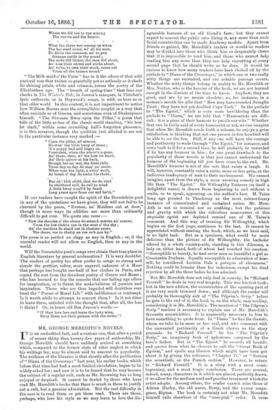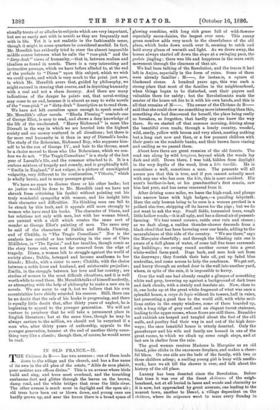MR. GEORGE MEREDITH'S NOVELS.
IT is an undoubted fact, and a curious one, that after a period of nearer thirty than twenty-five years of authorship, Mr. George Meredith should have suddenly arrived at something which, compared to the former state of utter neglect in which his writings lay, may be almost said to amount to popularity. The evidence of the libraries is that shortly after the publication of" Diana of the Crossways" last year, his earlier books, which before that time had had a most limited circulation, began to be widely asked for ; and now it is to be feared that he may become the subject of a regular cult, such as Mr. Browning has so long enjoyed or despised. It cannot be denied by those who have read Mr. Meredith's books that there is much in them to justify not a cult, but a genuine ad miration. But the real difficulty in the case is to read them or get them read. There are those, perhaps, who love his style as we may learn to love the dis- agreeable features of an old friend's face ; but they cannot expect to convert the public into liking it, any more than such facial eccentricities can be made Academy models. Apart from friends so gained, Mr. Meredith's readers or would-be readers may be divided into those who think him so desperately clever that it is impossible to read him, and those who cannot help reading him any more than they can help regretting at every second page that he should write as he does. It would be curious to know how many readers have been choked off by the prelude to" Diana of the Crossways," in which one or two really witty things are encrusted, and one notable passage occurs. Whether the witty things belong in reality to Mr. Meredith or Mrs. Norton, who is the heroine of the book, we are not learned enough in the diarists of the time to know. Anyhow, they are good, and are by no means obsolete; as, for instance, in a woman's mouth the gibe that "Mon may have rounded Seraglio Point ; they have not yet doubled Cape Turk." In the prelude to "The Egoist," which is even more bewildering than the prelude to "Diana," we are told that " Humourists are diffi- cult: it is a piece of their humour to puzzle our wits." Whether that can be fairly said of every humourist or not, we can imagine that when Mr. Meredith sends forth a volume, he enjoys a grim satisfaction in thinking that not one person in five hundred will be able to see the fun. Still, if any one will have the courage and pertinacity to wade through "The Egoist," for instance, and come back to it for a second time, he will probably be rewarded if he has any humour in him ; for one great drawback to the popularity of these novels is that you cannot understand the humour of the beginning till you have come to the end.. Mr. Meredith's humour is not of the sort that raises a laugh. It will, however, constantly raise a smile, more or less grim, at the ludicrous inadequacy of men to their environment. We cannot imagine, apart from the style, a more amusing comedy in high life than "The Egoist." Sir Willoughby Patterne (in itself a delightful name) is drawn from beginning to end without a smile, so to speak, appearing on the author's face. M. Tairie long ago pointed to Thackeray as the most extraordinary instance of concentrated and sustained satire. Mr. Mere- dith is not so ironical nor so scathing ; but the patience and gravity with which the ridiculous manoeuvres of this exquisite egoist are depicted remind one of M. Taine's comment. And this way of treating Sir Willoughby, which begins on the first page, continues to the last. It cannot be appreciated without reading the book, which, as we have said, is no light task. But as a specimen, what could be more delicious than the picture of Sir Willoughby, the bachelor adored by a whole country-side, standing in this dilemma, a lady on either hand, both of whom had touched his emotion. "Susceptible to beauty, he had never seen so beautiful a girl as Constantia Durham. Equally susceptible to admiration of him- self, he considered Lretitia Dale a paragon of cleverness." Nothing could be funnier than his indecision, except his final rejection by all the three ladies he has admired.
But Mr. Meredith does not only deal in comedy. In "Richard Feverell " he deals in very real tragedy. This was his first book; but in the new edition, the eccentricities of the opening part of it are very much trimmed down ; and although the reader will probably be thoroughly sick of "The Pilgrim's Scrip" before he gets to the end of it, the book is, on the whole, easy reading, considering it is Mr. Meredith's. The mention of "The Pilgrim's Scrip" renders it necessary to explain one of Mr. Meredith's favourite eccentricities, it is apparently necessary to him to have something to quote from. In "Diana" be has the diarists, whom we take to be more or less real, and who comment with the unwearied pertinacity of a Greek chorus as the story proceeds. In "Richard Feverell " he has 'The Pilgrim's Scrip," an imaginary book of aphorisms composed by the hero's father. But in "The Egoist" he exceeds all bounds, and quotes from what he chooses to call the "Great Book of Egoism," and spoils any illusion which might have been got about it by giving the reference, "Chapter 71," or "Section the seventieth, or the French section." However, to return to "Richard Feverell." It is a story with a most comic beginning, and a most tragic conclusion. There are several, indeed, many, characters in it which are almost perfectly drawn, if we allow for the medium used and peculiar treatment which the artist adopts. Among others, the reader cannot miss those of Adrian Harley, the old. nurse, Berry, and the young scape- grace, Ripton. The book is certainly not what Mr. Meredith himself calls elsewhere of the " rose-pink " order. It occao flimsily treats of or alludes to subjects which are very important, but are as rarely met With in novels as they are frequently met with in life. Yet it is not realistic in the fashionable sense, though it might in some quarters be considered morbid. In fact, Mr. Meredith has evidently tried to steer the almost impossible middle course between what he calls the " rose-pink " and the "dirty-drab" views of humanity,—that is, between realism and idealism as found in novels. There is a very interesting and instructive passage, which we have before alluded to, at the end of the prelude to " Diana " upon this subject, which we wish we could quote, and which is very much to the point just now, in which Mr. Meredith avers that, guided by philosophy, we might succeed in steering that coarse, and in depicting humanity with a real and not a sham decency. And there are many indications of the danger he points out, that novel-writing may come to an end, because it is almost as easy to write novels of the " rose-pink " or " dirty-drab " description as to read them.
We have not left ourselves space enough to speak much of Mr. Meredith's other novels. "Rhoda Fleming" reminds one of George Eliot, is easy to read, and shows a deep knowledge of the life of the uneducated. "Harry Richmond" is more like Disraeli in the way in which we are hurried into the highest society and see money scattered in all directions ; but there is far more real humanity in it than in any of Disraeli's books. The study of the Bohemian, Richmond Roy, who supposes him- self to be the sou of George IV., and heir to the throne, must be a choice morsel to those who like Bohemians, which we con- fess we do not. "The Tragic Comedians" is a study of the last year of Lassalle's life, and the romance attached to it. It is a curious mixture of tragedy and comedy, and is graphically told. "Emilia in England," if not vulgar, is a picture of unmitigated vulgarity, very different to its continuation, "Vittoria," which is wholly heroic, and in many passages grand.
We have no space to discuss these or his other books ; but no justice would be done to Mr. Meredith (and we have not shrunk from criticising his faults) without pointing out his truly wonderful sympathy with women, and his insight into their character and difficulties. No thinking man can fail to be struck by this trait, and it appeals still more strongly to women who have read his books. The character of Diana, and her relations not only with men, but with her woman friend, are painted with a skill which creates the same sort of wonder as George Eliot's painting of men. The same may be said of the characters of Dahlia and Rhoda Fleming, and of Clotilde, in "The Tragic Comedians." Nor is the analysis leas careful or less interesting in the case of Clara Middleton, in "The Egoist ;" and her troubles, though comic as the story turns out, were not far removed from the edge of tragedy. Diana, a woman left to struggle against the world of society alone ; Dahlia, betrayed and become anathema to her friends ; Rhoda, with a sister to save ; Clotilde, with the choice between a noble lover and husband, and aristocratic prejudice ; Emilia, in the struggle between her love and her country; are studies of women in the most difficult situations, and it is well worthwhile to read them. Mr. Meredith talks of himself modestly, as attempting with the help of philosophy to make a new era in novels. We are sorry to say it, but we believe that his own eccentricities have chiefly retarded his success. Still, there can be no doubt that the sale of his books is progressing, and there is equally little doubt that, after thirty years of neglect, he is beginning to appeal to the younger generation. We will not venture to prophesy that he will take a permanent place in English literature ; but at the same time, though he may be always caviare to the million, we should not be surprised if a man who, after thirty years of authorship, appeals to the younger generation, became at the end of another thirty some- thing very like a classic ; though then, of course, he would never be read.



































 Previous page
Previous page